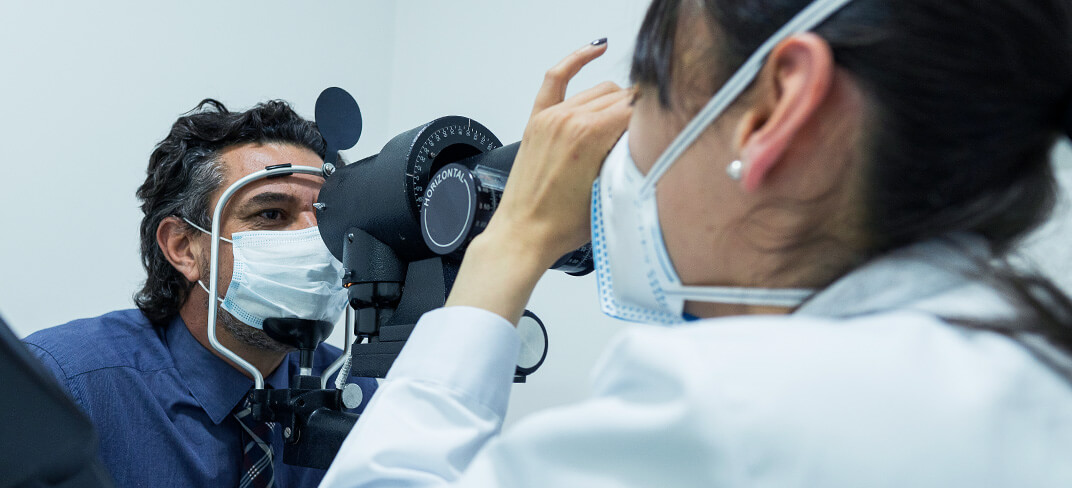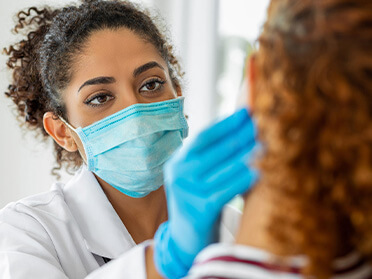
Ophthalmology at UPMC
UPMC has a highly specialized ophthalmology team to take care of the health of your eyes. Here you can undergo several preventive examinations, including eye and orthoptic examinations. In addition, you can take advantage of advanced ophthalmology procedures for more serious diagnoses.
We treat various eye diseases, such as cataracts and glaucoma. Thanks to excimer laser surgery we treat myopia, hyperopia, astigmatism and presbyopia.
At UPMC, we use the latest generation lasers – Lasik, PRK and cross-linking – which are equipped with an "eye-tracker" system. This means that the laser follows the movements of the eye, facilitating doctor-patient collaboration during surgery.
Book Exams and Services
At UPMC, we offer ophthalmology services at the following facility:
Specialisations and Ophthalmology Services
The visits and examinations available at our Ophthalmology Center aim to prevent, diagnose and treat eye diseases. In particular, our team of specialists in ophthalmology, orthoptics and ophthalmology embrace the following areas of specialization:
- Ophthalmological diagnostics: Instrumental examinations are performed to exclude any abnormalities in the neuromuscular apparatus of the eye and diagnostic screenings for glaucoma, retina, and cornea. In addition, it is possible to undergo specialized examinations in preparation for laser interventions that correct refractive defects. Eye and orthoptic examinations are useful not only for diagnostics, but also in the issuance of certificates such as driving licenses and in occupational medicine.
- Ophthalmic surgery: Glaucoma is treated by means of a laser or surgical interventions such as trabeculectomy, valvular implantation or deep sclerectomy. It is used in case of retinal detachment and for cataracts, strabismus, ptosis, corneal transplantation and amniotic membrane transplantation. It also provides intravitreal injections and outpatient interventions, such as in the case of pterygium, ectropion, entropion and blepharoplasty.
- Refractive surgery: This involves laser interventions to treat cataracts and to improve the vision of patients suffering from visual defects such as astigmatism, hyperopia, presbyopia, and myopia.
- Neuro-ophthalmology: This branch of medicine draws from neurology and ophthalmology. Diagnostics and therapeutic management may require the collaboration and intervention of different specialists.
- Pediatric ophthalmology: Dedicated to children, this includes newborn screenings and pediatric eye examinations. A specialist eye examination is recommended every 12-18 months, to investigate the condition of the eyes and to intervene promptly, if necessary. In children, the visual system has characteristics that allows for the recovery of defects in vision more easily than in adults.
Neuro-Ophthalmology at UPMC
Neuro-ophthalmology deals with the diagnosis and treatment of neurological disorders of vision. These are visual problems due to alterations in the connections of the eye with the central nervous system, including:
- Alterations of the afferent visual system. These concern the transmission of the image from the eye to the brain and its processing. They are manifested by reduced vision or visual field due to damage to the optic nerve, for example, optic neuritis, ischemic neuropathies and papilledema. Alterations may also be due to damage to the central visual pathways, for example, brain tumors, aneurysms, and strokes.
- Alterations of the efferent visual system. These concern the control of eye movements by the brain. They are manifested by double vision (diplopia) or abnormal eye movements (for example, nystagmus). They can also lead to alterations of the pupil, such as anisocoria, or eyelids, including ptosis or blepharospasm).
Pediatric Ophthalmology at UPMC
Another field of specialization in ophthalmology is pediatric ophthalmology which treats children. Our services include:
- Newborn screening. Objective examination of the ocular appendages and the red retinal reflex by means of the examination of the fundus of the eye. It excludes pathologies such as congenital ptosis, congenital cataracts, congenital glaucoma, retinal coloboma, retinopathy of prematurity (ROP), and retinoblastoma. This type of screening is suggested especially for infants at high genetic risk. It is good to do this for babies born prematurely and of low weight before discharge from maternity wards.
- Pediatric eye examination. To exclude the presence of refractive defects (myopia, astigmatism and hyperopia), alterations in ocular motility (strabismus, eye syndromes and nystagmus), and amblyopia.
- Specialist interventions. To treat congenital ptosis, congenital glaucoma, congenital cataracts, coloboma, retinopathy of prematurity (ROP) and retinoblastoma.
Diagnostic Tests at UPMC
Our services are available to people who wish to make visits and specialized examinations in different areas.
Ophthalmological diagnostics
You can undergo:
- Aberrometria.
- Removal of superficial foreign bodies.
- Biometrics with Barrett's formula.
- Ultrasonic ocular biometrics.
- Optical ocular biometrics.
- Endothelial biomicroscopy with cell count.
- Biopsy of ocular tissues.
- Tonometric curve.
- Examination of the computerised field of view.
- Examination of the chromatic sense with Ishihara test.
- Fundus examination.
- Orthoptic exercises (at least 5 sessions).
- Gonioscopia.
- Washing and probing of the tear pathways.
- Complete OCT (OCT macula and optic nerve).
- Corneal pachymetry.
- Pupillometria.
- Glaucoma screening.
- Screening for diabetic retinopathy.
- Screening for hypertensive retinopathy.
- Screening for age-related macular degeneration.
- Eye screening for occupational medicine.
- Screening for the assessment of suitability for refractive surgery.
- Eye swab with antibiogram.
- Test di BUT.
- Contrast sensitivity test.
- Shirmer test.
- Tomography of the optic nerve.
- Tonometry.
- Corneal topography.
- YAG laser treatment.
- Retinal laser treatment.
- Ophthalmoplasty surgery visit.
- Neurophthalmologic visit.
- Paediatric and preschool eye examination.
- Eye examination for adults (also for certificates of renewal of driver's licenses).
- Orthoptic visit.
Ophthalmic surgery
At UPMC, you can undergo the following ophthalmic surgeries:
- Pterygium removal.
- Blepharoplasty.
- Cataract.
- Cataract phacoemulsification.
- Cyclocrium treatments.
- Retinal detachment.
- Retinal detachment by scleral route (with or without plumbing).
- Glaucoma (outpatient and inpatient).
- Interventions by tear pathways (dacryocystorhinostomy).
- Intravitreali Eylea, Lucentis, Ozurdex, Taioftal.
- Pterygium.
- Ptosis.
- Bilateral and unilateral strabismus.
- Corneal transplant.
- Corneal transplant (corneal transplant or keratoplasty).
- Amniotic membrane transplantation.
- Limbar transplantation.
- Minimally invasive vitrectomy.
Refractive surgery
At UPMC, you can undergo the following refractive surgeries:
- Cataracts with laser Femto.
- Cross-linking.
- iLASIK std/customizzata tunnel per ICRS.
- Arched engravings with laser Femto.
- PRK.
- PRK customizzata.
Eye examinations for laser interventions
Preliminary eye examinations for laser interventions are aimed at correcting refractive defects and include:
- Examination of the tear film.
- Examination of the anterior segment.
- Examination of the posterior segment in mydriasis.
- Examination of refraction in cycloplegia.
- Examination of subjective refraction, without and with correction, monocular and binocular.
- Orthoptic examination with evaluation of ocular dominance (often associated with presbyopic treatment).
- Pupillometria.
- Corneal tomography, pachymetry and aberrometry.
- Tonometry.
Treatment of cataracts
Interventions for the treatment of cataracts include:
- Anterior capsulotomy with variable diameter and safety distance from the variable Iris.
- Fragmentation of the crystalline lens with geometry, variable pattern size depending on the cataract.
- Arched corneal incisions, each of variable size, depth, geometry and position.
- Primary and secondary corneal incisions of variable size, location and geometry.
Eye Diseases Treated at UPMC
Among the diseases treated by the our specialists are:
- Astigmatism.
- Cataract.
- Glaucoma.
- Hypermetropia.
- Maculopatie.
- Autoimmune diseases (for example, juvenile rheumatoid arthritis).
- Myopia.
- Malformative pathologies of the orbit, congenital and acquired.
- Neuro-ophthalmological pathologies (for example, optic neurites and oedema of the papilla).
- Retinal pathologies also congenital.
- Presbyopia.
- Retinoblastoma.
- Strabismus.
Who Should Undergo Ophthalmology Examinations?
UPMC offers professional support to people with various eye disorders and those wishing to look after the health of their eyes. You will meet with our specialist team and undergo the necessary clinical tests for the diagnosis and therapeutic treatment that best suits your case.
It is important not to ignore symptoms you may have so you can contact us with or without request from your doctor if you suffer from the following:
- Eye strain.
- Visual fogging or vision of bright halos.
- Burning in the eyes.
- Chalazion.
- Headache.
- Difficulty in visual memorization.
- Difficulty in focusing or blurry vision.
- Diplopia or split vision.
- Photophobia.
- Eye infections or blepharitis.
- Hypermetropia.
- Tearing or dryness in the eyes.
- Presbyopia.
- Reduction of color brilliance.
- Reduction of visual ability.
For childhood eye prevention, a pediatric eye examination is recommended every 12-18 months up to preschool age.

We offer medical services and services on a private basis or in agreement with the main insurance companies. Some of our services are also affiliated with the National Health System.
For more information on active agreements, visit:
